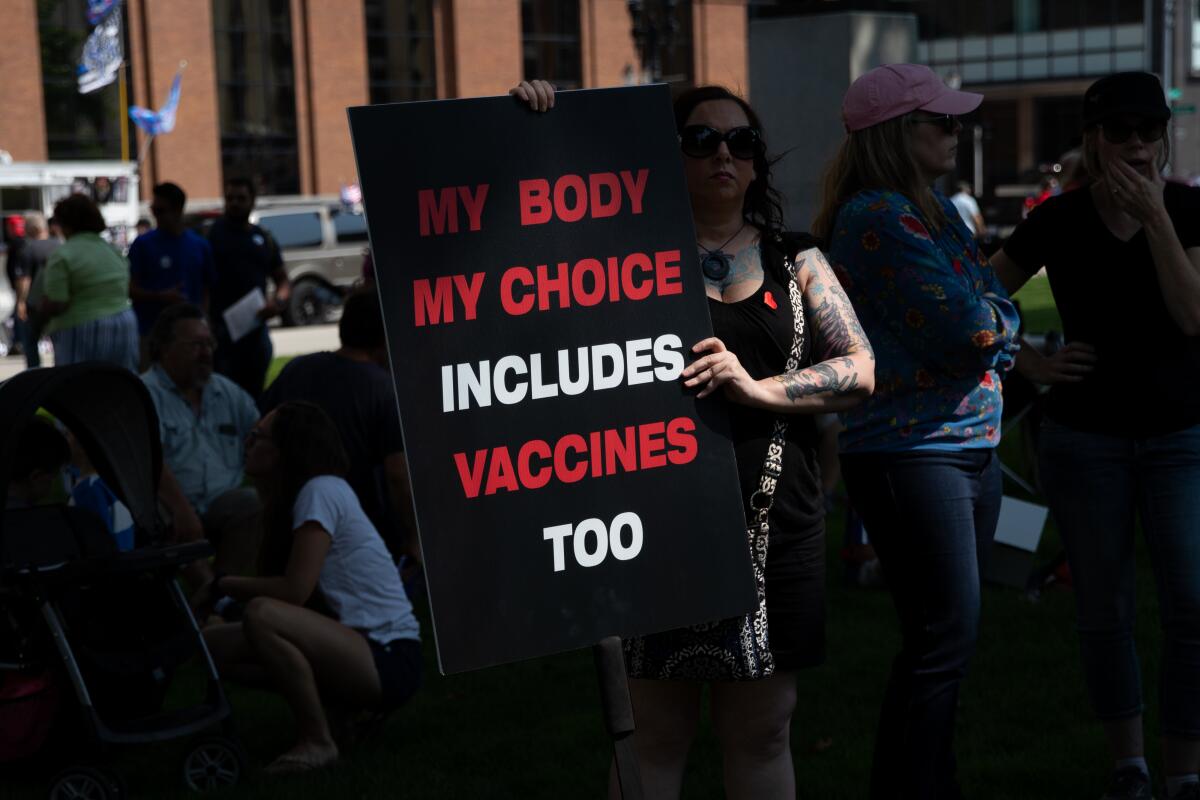Op-Ed: The next threat on the horizon: Religious exemptions from vaccine mandates

- Share via
I will never forget a cancer patient I once treated who had believed that prayer and Chinese herbal medicine alone would help her. For two years, she had refused all Western medications and treatment. When she finally came to the hospital, I felt, just beneath the soft warm skin of her abdomen, hard metastatic tumors floating like rocks. Her disease was now too far gone to cure. A few weeks later, she died. Her case was one of the saddest I’ve ever seen: Her quasi-religious beliefs had helped to kill her.
I have recently thought of her, as colleagues at hospitals, universities and other employers around the country report they are becoming deluged with requests for religious exemptions to new vaccine mandates.
Now that the Food and Drug Administration has fully approved the Pfizer COVID-19 vaccine, more employers large and small are likely to begin requiring vaccinations for workers, which is vital for ending the pandemic.
But a huge loophole looms — religious exemptions. The Equal Employment Opportunity Commission has said that under Title VII of the Civil Rights Act of 1964, employers should accommodate workers who have “sincerely held” religious beliefs, if the accommodation poses no undue hardship on the employer.
Many institutions are already becoming overwhelmed with requests for such exemptions to COVID-19 vaccine mandates, and the need to evaluate each one. In coming weeks and months, these requests are likely to increase. In New York state, around 25% of hospital workers and 32% of nursing home workers are not fully vaccinated.
Employers are struggling, unsure how to proceed. Religious beliefs can be vague and hard to pin down. And unfortunately, many people are using religion as an excuse.
These requests also range widely. Some people seeking an exemption wrongly argue that the vaccines are made using fetal tissue. While Johnson & Johnson uses fetal cell lines (derived from fetal cells taken in 1985 and replicated innumerable times in labs) for its vaccine, Pfizer and Moderna do not. Other applicants argue, “My body is pure, I don’t want anything unnatural inside me.” Or they say they believe only in natural herbal treatments.
Yet these requests for exemptions, if granted, could endanger others, including family members, co-workers and patients, if the employee works at a hospital. The Occupational Safety and Health Act requires a safe and healthy workplace for everyone, and the Centers for Disease Control and Prevention and EEOC have stated that COVID-19 is a “direct threat” in the workplace.
Moreover, Pope Francis and the national leadership of many churches, including Mormon leaders and the National Assn. of Evangelicals, have strongly endorsed vaccination. No leaders of a major religion have supported religious exemptions. Even Christian Scientists tell members to “respect” public health officials and follow “the laws of the land, including those requiring vaccination.”
Alas, not all religious organizations are complying. Websites have sprung up on how to get a religious exemption, with groups such as the National Catholic Bioethics Center and the Colorado Catholic Conference providing online templates for requests. And some religious workers, along with people in other fields, are coaching students and employees on how to evade COVID-19 prevention efforts, including vaccine requirements.
Individuals have a right to their religious beliefs, but not a right to harm others. As Supreme Court Justice Oliver Wendell Holmes Jr. famously wrote, even free speech has limits, stopping at the point of falsely yelling “fire” in a crowded theater.
Given outbreaks of measles at Disneyland and elsewhere, six states, including California, have eliminated all religious exemptions for required school immunizations. But 44 states and Washington, D.C., still allow these exemptions, and 15 states allow philosophical exemptions. On Aug. 26, New York eliminated religious exemptions for COVID-19 vaccine mandates for healthcare workers.
Other states, such as California, should do so as well. Unfortunately, most states, probably won’t follow suit. These issues have become highly politicized. Twenty states (all with Republican governors) have already banned businesses from requiring proof of vaccination.
Individual employers will have to address these challenges and questions about which beliefs are “sincere.”
Applicants should not be able to simply check off a box to ask for an exemption, but have to show evidence of their beliefs and be interviewed to prevent them from cutting and pasting text from online templates.
Because of these complexities and fears of lawsuits, employers may decide simply to approve all requests, and try to make accommodations, requiring that unvaccinated employees wear masks, socially distance and test frequently for COVID-19. But at many workplaces, including hospitals, schools and factories, these precautions will be hard to carry out, monitor or enforce.
Courts will surely soon be involved, but the judicial process can be messy and inconsistent. In Chenzira vs. Cincinnati Children’s Hospital Medical Center, for instance, a federal court in Ohio ruled that veganism could be considered a religious practice and exempted an employee from a hospital-mandated flu shot.
To curb continued COVID-19 spread, public health officials and political leaders need to develop appropriate guidelines to help hospitals, schools, corporations and other employers deal with religious exemption claims.
My patient with metastatic cancer showed me how religious beliefs can at times harm health. If we do not close this loophole now, loosely drawn religious exemptions from vaccination mandates will contribute to ever more sickness and death.
Robert Klitzman is a professor of psychiatry and director of the bioethics masters program at Columbia University. He is the author of “Designing Babies: How Technology Is Changing the Ways We Create Children.”
More to Read
A cure for the common opinion
Get thought-provoking perspectives with our weekly newsletter.
You may occasionally receive promotional content from the Los Angeles Times.










